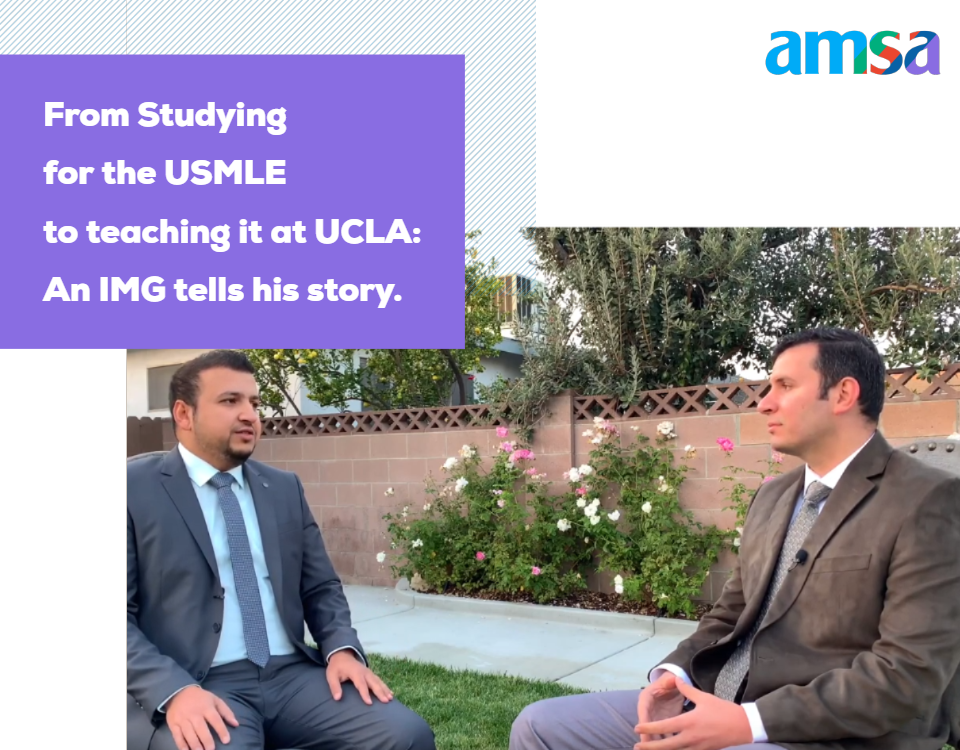Interview prepared by Mustafa Almukhtar, AMSA 2019-2020 Professional Development Coordinator, and hosted by Ahmed Suhail, AMSA member. Article by Haya Al Any, AMSA 2019-2020 Professional Development Chair.
Dr. Mustafa Albustani finished his medical education in Baghdad, Iraq. After getting his diploma from one of the top-notch medical schools in the area, he completed a three-year clinical training in Iraq. He then decided to migrate his career to the United States. In 2011, he arrived to the U.S. and began looking into the route that international medical graduates, IMGs, take in order to practice medicine in the States. His hard work finally landed him a clinical faculty position at the University of California, Los Angeles (UCLA).
Dr. Albustani opens up the talk about his journey by reminiscing about the inspiration that ushered him to medical school. Growing up under two physician-parents, becoming one himself always made sense. Equipped with exposure and motivation, he enrolled at Al-Kindy College of Medicine, of the University of Baghdad, the school from which he received his degree. After graduation, he completed three years of clinical training. Next he made a pivot in his career by moving to the US. Why did he endure this transition? [highlight]Dr. Albustani states that the United States stands in the forefront of medical education and training; he was enticed by the reputable research facilities, the supportive education system and the comprehensive healthcare system.[/highlight]
Moving the spotlight to the first foothold for IMGs , he reflected on his preparation for the USMLE series. He recounted that he finished the three exams, Step one, two and three, in a total of seven months. To prepare for the exams. he relied on a combination of lectures, notes, textbooks and question banks.
Upon satisfying the scorecard aspect of his curriculum vitae, he sought to familiarize himself with the operation of the healthcare system in the United States. He acknowledges that without clinical involvement and research engagement, the odds of matching into a residency program are not as promising. For IMGs specifically, he reiterates the [highlight]importance of establishing a network of connections in the field.[/highlight] He considers himself lucky to have met a doctor who was active in research. By the time he applied for residency, he was a part of two research projects.
The endless moments of suspension had curtailed with the long-awaited news; he had successfully matched into Med-Peds. He posits that residency represents a transformation in perspective, from being a student to being a physician. He states that the workload and the responsibilities rise to a higher level but then everything levels off when one develops their own “survival skills.”
During his third year of residency in Tulsa, Oklahoma, he was elected the chief resident. Dr. Albustani points out that such an achievement comes by thoughtful planning rather than coincidence. He advises that coming to the United States is worth going through turbulence before safely landing in a settled career. It is more challenging for IMGs to embark onto residency, and for this reason, they need to exert an added effort. He stresses the importance of securing adequate scores and tagging them along with an impressive CV. [highlight]A strong CV, to him, is one where devotion to medicine is pronounced through research, rotations and other clinical involvement.[/highlight] He emphasizes the significance of having strong letters of recommendation written by well-renowned persons in the field.
He concludes his story by revealing that he had always aspired to become an educator. He wanted to follow in the footsteps of his parents, mentors and teachers, to whom he attributes the formulation of his personality. He joined the faculty at UCLA in 2018 after working in Saint Francis Health System for less than a year. He finds in his current position the opportunity to pass on the gift of medical knowledge to the next generations.
The road to residency is not an easy one for IMGs. Learn some of the things you’ll need for the journey in the IMG Summer Series.

